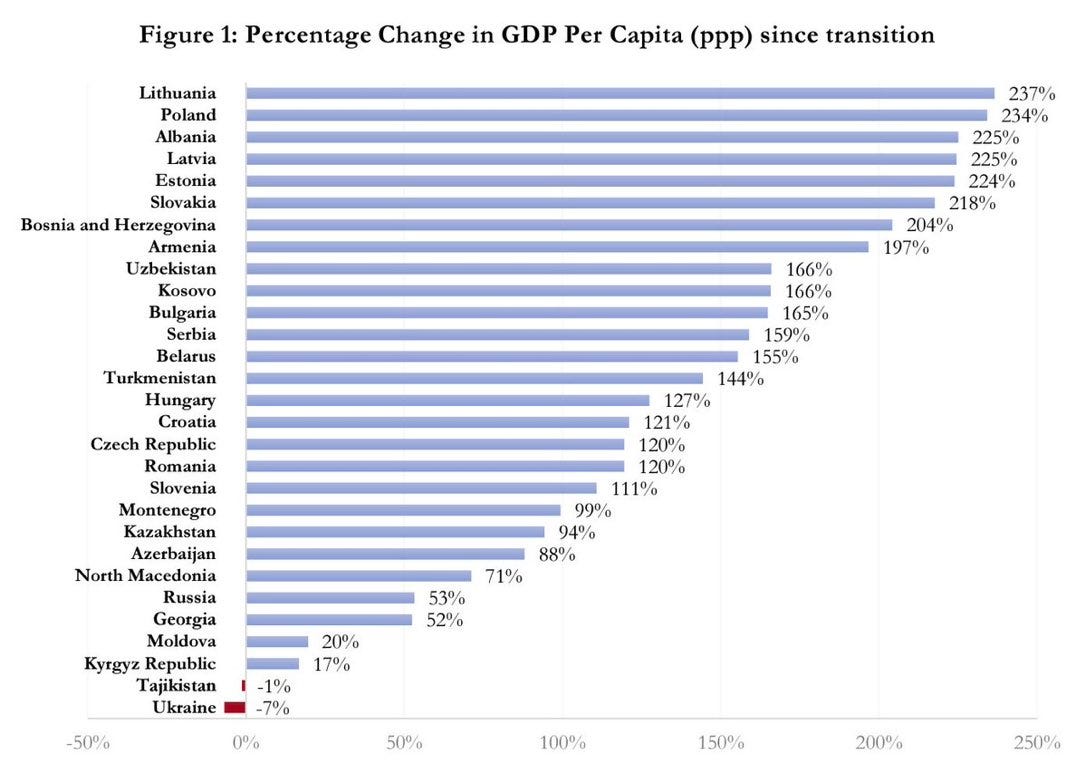Does Emigration foster Conservatism?
Spoiler: this is a very dorky post about methodology.
What drives cultural change, and how can we identify those causes?
One option is to track attitudes over several decades, across countries, and ascertain commonalities amongst societies with faster cultural change.
Akaliyski, Welzel and Hien (2021) trace shifts in World Values Surveys between 1900 and 2017. They find that everyone expresses far greater support for personal freedom and gender equality - except in the Orthodox East.
In the panels below, they divide Europe into four cultural zones: the ‘Protestant West’, ‘Catholic West’, ‘Orthodox East’, and ‘Ex-communist but non-Orthodox’. As you can see, there has been rapid change everywhere but countries that are Orthodox.
Why might this be? Is this a clash of civilisations, geopolitical rivalry, or is Orthodox culture inherently resilient? Speculations abound.

But this methodology has one big problem
It assumes a stable population. Tracing change over time, it effectively asks ‘have their beliefs changed or not?’.
But what if there has been a massive exodus of educated, young liberals?
Out-migration has been very high in Eastern, South-Eastern Europe and Caucasia. Migrants are often university graduates.
Who is left?
Old people with more conservative ideas.
The same pattern occurs at a subnational level. UK graduates flock to London, since its the growth hub. Economically lagging regions remain older, less educated and more conservative. They systematically lose the cohort that is most liberal.
Children socialise their parents
Educated liberals have spill-over effects, via ideological persuasion. As students expand their horizons, learn from peers and become more egalitarian, they push their parents to see things differently.
Staying with a family in Delhi, I once observed a heated argument. Jasminder (a graduate)ultimately convinced her mother to permit cow slaughter and respect religious diversity.
Let me give an anecdote from my own family. My grandmother (Ann) was born in Yorkshire, in 1926. At that time, it wasn’t respectable for a young woman to walk alone, without a chaperone. When Ann became a parent, she worried about her daughter’s (Isabel) safety and imposed strict curfews. But this was the 1970s and Isabel wanted to go to rock concerts with her friends. Annoyed by her brother’s far greater freedoms, Isabel had to lobby. She socialised her parents (just like my friend in Delhi).
Graduates not only socialise their parents. If they become corporate CEOs, philanthropists, donors, journalists, academics, trusted authorities, film-makers, writers, revered celebrities, or politicians, they may have an even bigger cultural influence.
So beware!
Panel data provides useful information about attitudinal change in that place. But even if certain countries show persistent traditionalism, we cannot assume this is due to culture. It’s possible - as in Eastern Europe - that many liberals have simply left.
Pre-empting replies
I am not suggesting that out-migration entails traditionalism. The Baltics have experienced a massive exodus, as well as rapid growth and democratisation. Compensating for population loss, prosperity fosters secularisation, egalitarianism and individualism.
Nor am I opposing migration! I merely raise the fact of massive out-migration as a problem for social science methodologies. 😊









Fascinating. I think the Baltic quandary is worth thinking about, given that their population loss has been very high yet seem to be much more liberal than e.g. Bulgaria, Ukraine or Serbia. I doubt their emigrants have been less liberal, so something else is going on.
It's also interesting to note the large error bar on "social autonomy" for the Orthodox east